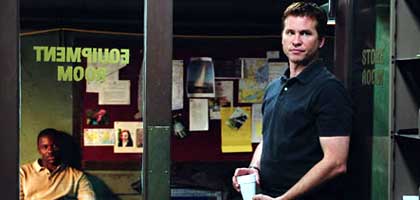
Spartan
Germany/USA 2003

Reviewed by Liese Spencer
Synopsis
Our synopses give away the plot in full, including surprise twists.
When the American President's daughter Laura Newton (Kristen Bell) disappears from Harvard, military officer and special ops trainer Robert Scott (Val Kilmer) is recruited to find her, paired with novice Curtis (Derek Luke). Working with other government intelligence agencies, they stumble on a white slavery ring that may have abducted Laura. Just before Scott and Curtis trace Laura's whereabouts, her death in a sailing accident is reported. Scott returns to his country home but Curtis arrives with proof that Laura is alive, her 'death' part of a cover-up.
Curtis and Scott go to a beach house where they believe Laura was held. Curtis is fatally shot by an offshore sniper. Scott begins his own unofficial investigation. At an upmarket health farm he tries to reach the First Lady but is detained by a high-level security woman who reveals that she is Laura's mother and that Laura was snatched while the President was 'tomcatting' in Boston. Political operatives Burch (Ed O'Neill) and Stoddard (William H. Macy) have abandoned Laura's rescue rather than jeopardise his re-election campaign.
Scott heads to the Middle East and storms the compound where Laura is being held but at the airport, before she can be smuggled out, Scott finds a tracking device in his knife. Stoddard appears with a special ops sergeant; after a shoot-out Laura escapes with a nearby news crew. Scott is left behind nursing the body of the fatally injured sergeant.
Review
A high-speed succession of double-crosses, decoys and cover-ups, David Mamet's new movie is a masterful imagining of institutional and inter-personal paranoia. For the first two acts it's almost faultless and, while it may take a few shortcuts to arrive at its conclusion (notably the fortuitous presence of a Swedish film crew), Spartan remains a stimulating, edge-of-the-seat political thriller. It's also absurdly macho, as only Mamet can be. Skilfully working audience insecurities, the writer-director pares his screenplay down to the bone, gunning through a taut and twisting plot with as little exposition as possible. His strategy pays off. Left in the dark we actively engage in solving the puzzles he sets us, or at least in trying to keep up. The effect is compulsive and rather exhausting – you reach the end of the film feeling as though you have had an intellectual kicking.
The title may refer to the 'élite warrior class' to which Val Kilmer's Scott – a special ops trainer recruited to find the abducted daughter of the president – belongs but it might just as well describe Mamet's handling of the genre. Dramatic structure and dialogue are ruthlessly efficient. Indeed, so virtuoso is he at ratcheting up the tension that there are times you laugh out loud with pleasure at his whiplash shifts in direction and beats-per-minute screenwriting brinkmanship. Unfortunately, there are also times when you laugh out loud at the big-dick daftness of it all. One exchange has Scott intone: "In the city always a reflection, in the woods always a sound.""What about the desert?"his protégé asks. "You don't want to go to the desert."While the 'search and rescue' premise fits comfortably into the thriller genre, Spartan's elaborately plotted conspiracy and theatrical style are pure Mamet. Sure, the static set-ups of his earlier films are replaced by kinetic camerawork and shock shootings, but the main action remains psychological. As Scott tells rookie Curtis, "It's all in the mind, that's where the battles are."Scott's mission is to 'get the girl' and for much of the film he and the rest of the almost entirely male cast refer to her as just that: "the girl". Their emotional distance is both professional and terrifying, a patriotic inhumanity perfectly suited to a film-maker cerebral to the point of abstraction.
When Curtis naively tries to tell Scott his name, he's rebuffed with: "Do I need to know?" Mamet's characterisation is portioned out on the same basis, so his complex plot can stay fast-moving and supple enough to accommodate maximum paranoia. At times the film begins to feel a bit like an action relay, with new faces popping up to carry the plot to its next stage before being unceremoniously dispatched. While Curtis' shock killing brilliantly disarms expectations, such ambush tactics are less effective elsewhere. An emotive moment when the identity of Laura's real mother is revealed, for example, is cut brutally short as the director snaps off on his next dazzling plot tangent. After the headache-tight tension of the first two acts, Mamet plays fast and loose in act three, as if, with the end in sight, he loses interest. What he really wants to do is keep playing the game.
Credits
- Director
- David Mamet
- Producers
- Art Linson
- Moshe Diamant
- Elie Samaha
- David Bergstein
- Screenplay
- David Mamet
- Director of Photograhy
- Juan Ruiz Anchia
- Edited by
- Barbara Tulliver
- Production Designer
- Gemma Jackson
- Music
- Mark Isham
